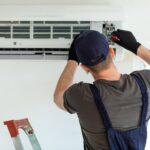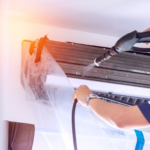Start Troubleshooting the Most Common Lg Air Conditioning Problems
LG air conditioners are some of the best on the market, but even the best products can have problems from time to time.
If your LG air conditioner isn’t working properly, you may feel hot and frustrated. Many people rely on their air conditioners to get through the sweltering summers, so it can be a real pain when they stop working correctly.
So before you call a technician, try troubleshooting your LG air conditioner using our guide. We’ll walk you through some common problems and solutions so that you can get your AC up and running again as soon as possible.
Guide to Troubleshooting Usual Lg Air Conditioning Issues
Water Seeps Into the House
Walls, ceilings, and floors can suffer water damage if your air conditioner leaks. So if you notice any water stains or puddles around your AC unit, it’s important to take care of the problem immediately.
First, try to determine where the leak is coming from. The most likely culprit is a failing drainage pipe. If the pipe is blocked or damaged, water will build up inside the unit and eventually start to leak out.
If you can’t see the source of the leak, it’s best to call a technician. We’ll be able to quickly pinpoint the problem and get it fixed before any severe damage is done.
The Air Conditioner Does Not Generate Cold Air
Hot summers are the perfect time to break out the air conditioner, but what do you do when your AC unit isn’t generating cold air?
First, check the thermostat to ensure it’s set to “cool” mode. If it is, the next step is to look at the air filter. A dirty filter can restrict airflow and prevent the unit from cooling properly.
The problem may be with the air conditioner if the filter looks clean. First, try turning off the unit for a few minutes to see if that resets it. If not, you may need to call a technician for help.
The Air Vents Are Hindered or Dirty
Most air conditioners have vents that help circulate air around the room. The unit’s performance can impede if these vents are blocked or dirty.
To clean the vents, remove any furniture or other items blocking them. Then, use a vacuum attachment to remove any dirt and dust that’s built up on the vents.
If the vents are still dirty after vacuuming, you can try cleaning them with a damp cloth. Just be sure not to use any harsh chemicals or cleaners, as they could damage the vents.
The Remote Control Is Non-Functional
A faulty remote control can be a real pain, especially when it’s hot and you just want to turn on the AC.
Before you start troubleshooting, ensure that the remote batteries are fresh. If they are, try resetting the air conditioner by unplugging it for a few minutes. It will clear any errors that may be causing the remote to malfunction.
If the remote still isn’t working, the problem may be with the air conditioner itself. In this case, you’ll need to call a technician for help.
The Air Conditioner Is Not Blowing Any Air
Not blowing cold air is one thing, but if your ducted air conditioner isn’t blowing any air at all, then that’s a whole other problem.
One feasible reason for this is that the fan blades are dirty. To clean them, turn off the unit and remove the front panel. Then, using a soft brush or a cloth, remove any dirt and debris.
Another possibility is that the fan motor is defective. However, it is a more serious issue that will require the help of a technician.
The Unit Does Not Turn On
The unit not turning on is usually caused by a power issue. Start by confirming the circuit breaker to check if it’s been tripped. If it has, simply reset it and try to turn on the air conditioner again.
If the circuit breaker is fine, next is to check the power cord. Make sure that it’s plugged in securely and that there are no frayed or damaged wires.
If the power cord looks fine, the problem is likely with the air conditioner itself. Seek help from a qualified technician.
Is It Worth Repairing an Air Conditioner?
Repairing an air conditioner can be expensive, so it’s important to weigh your options before deciding.
If the unit is old and needs frequent repairs, it may be time to invest in a new one. However, repairing the unit may be the best option if the issue is something minor, like a dirty filter or blocked vents.
Many people choose to repair it because they don’t want to deal with the hassle of buying and installing a new one. For example, if you have a split system air conditioner, which is two units (one inside and one outside), then you’ll need to purchase a new outdoor unit, which can be expensive.
Another thing to remember is that repair costs can add up over time. So if you constantly have to pay for repairs, it may be cheaper, in the long run, to just buy a new air conditioner.
If you’re not sure whether to repair or replace your air conditioner, it’s always best to consult with a qualified technician. They can assess the situation and help you make the best decision for your needs.
No matter what you decide, remember that repairing or replacing an air conditioner is a big investment. So be sure to research and choose the best option for you and your budget.
Guide to Maintaining Your Air Conditioner
Proper maintenance is the key to keeping your air conditioner running smoothly. Here are a few tips to help you keep your AC in top condition:
- Change the air filter regularly. A dirty air filter can impede the performance of your unit and cause it to break down more frequently.
- Keep the area around your air conditioner clean and free of debris. Leaves, dust, and other debris can clog the coils and cause the unit to overheat.
- A professional should service your air conditioner at least once a year. It will help ensure that all the parts are working properly and that there are no potential issues.
By following these simple tips, you can help prolong the life of your air conditioner and rest assured knowing that it will be there to keep you cool all summer long.
Learn more about common issues people have with air conditioners
If your air conditioning isn’t working as well as it used to, there are a handful of likely reasons why. Some issues are simple and easy to fix, while others may require professional attention. From our experience, these are the most frequent problems that cause an AC unit to stop cooling effectively.
- Air conditioner unit is frozen or icing up
- Air conditioner unit is leaking water
- Air conditioner heat mode is not working
- Air conditioner isn’t turning on
- Air conditioner is making loud buzzing noises
- Ducted air conditioner isn’t working in all rooms
- Air conditioner smells
- Air conditioner is sweating inside
- Air conditioner is blowing hot air
- Air conditioner keeps turning off
What are most air conditioner breakdowns caused by?
Most AC breakdowns can be avoided with regular maintenance, but some issues are inevitable over time. Common culprits include refrigerant leaks, sensor problems, and electrical malfunctions, all of which can cause your system to stop working. Below are the most frequent reasons air conditioners fail.
- AC breakdown caused by electrical problems
- PCB faults
- Faulty air conditioner compressor that needs replacing
- Faulty air conditioner capacitor that needs replacing
- Faulty air conditioner condenser that needs replacing
- Faulty air conditioner evaporator coil that needs replacing
- Air conditioner pipe insulation that needs replacing
There are many more reasons your air conditioner may not be working, and our first step with any repair job is to diagnose the issue with an initial inspection.
Get a free quote on air conditioning repairs in Brisbane
When your air conditioner isn’t working properly, it’s easy to put off getting it checked. But small issues can turn into costly repairs if left unattended. Our team provides air conditioning repairs in Brisbane, starting with a free quote to help you figure out what’s needed.

